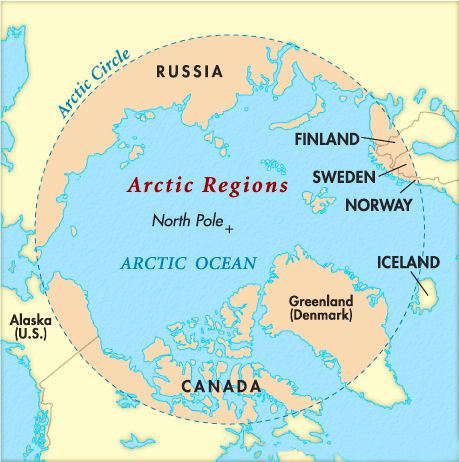Biodiversity & Environment
Impact of Global Warming on Permafrost
- 14 Sep 2021
- 5 min read
Why in News
According to the latest IPCC report, increasing global warming will result in reductions in Arctic permafrost and the thawing of the ground is expected to release greenhouse gases like methane and carbon dioxide.
Key Points
- Permafrost:
- Permafrost is any ground that remains completely frozen - 32°F (0°C) or colder - for at least two years straight.
- These permanently frozen grounds are most common in regions with high mountains and in Earth’s higher latitudes - near the North and South Poles.
- Permafrost covers about 15% of the land area of the globe.
- Although the ground is frozen, permafrost regions are not always covered in snow.
- Landscapes with large stretches of permafrost are often called tundra. The word tundra is a Finnish word referring to a treeless plain. Tundra is found at high latitudes and at high altitudes, where the permafrost has a very thin active layer.
- Concerns Regarding Melting Permafrost:
- Affects Infrastructure:
- It will affect countries where roads or buildings were constructed on permafrost.
- Release of Greenhouse Gases:
- It entombed and froze the organic material in the ground.
- If the ground begins to thaw, this material will become available for microorganisms to break down.
- In some environments, the microorganisms will release carbon dioxide, and in others release methane which is about 25 to 30 times more potent as a greenhouse gas than carbon dioxide.
- Change from Carbon Storehouse to Carbon Emitters:
- Some permafrost regions have changed from being a carbon storehouse to being places that are net emitters of carbon.
- Increase in the Number of Forest Fires:
- This year Russia witnessed a forest fire whose total area was the size of Portugal. Usually, after a fire, one expects the forest to grow back in the next 50 years to 60 years. This restores the carbon stock in the ecosystem.
- But in the tundra, the peat is where the organic material is and this takes a very long time to accumulate. So if peat is burned and released into the atmosphere, then it will take centuries to restore that carbon stock at ground level.
- Releasing New Bacteria or Viruses:
- The environment now is so much more suitable than during the Ice Age for not just human life, but also the evolution or development of viruses and bacteria.
- So, the chances of emerging new bacteria or viruses cannot be ignored.
- Affects Infrastructure:
- Steps to be Taken:
- Stop Rapid Climate Change: In order to curtail climate change and save the permafrost, it is indispensable that global CO2 emissions be reduced by 45% over the next decade, and that they fall to zero after 2050.
- Slow Down Erosion: The scientific journal Nature suggested building a 100-metre-long dam in front of the Jakobshavn glacier (Greenland), the worst affected by Arctic melting, to contain its erosion.
- Combine Artificial Icebergs: Indonesian architect has won an award for his project Refreeze the Arctic, which consists of collecting water from melted glaciers, desalinating it and refreezing it to create large hexagonal ice blocks.
- Increase Their Thickness: Some researchers propose a solution to manufacture more ice. Their proposal consists of collecting ice from below the glacier through pumps driven by wind power to spread it over the upper ice caps, so that it will freeze, thus strengthening the consistency.
- People’s Awareness: The tundra and the permafrost beneath it may seem far away, but no matter where we live, the everyday choices we make contribute to climate change.
- By reducing our carbon footprint, investing in energy-efficient products, and supporting climate-friendly businesses, legislation, and policies, we can help preserve the world’s permafrost and avert a vicious cycle of an ever-warming planet.





